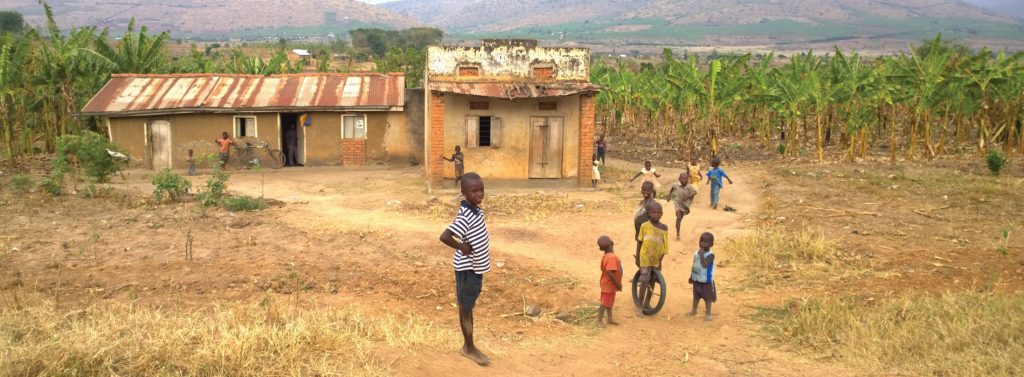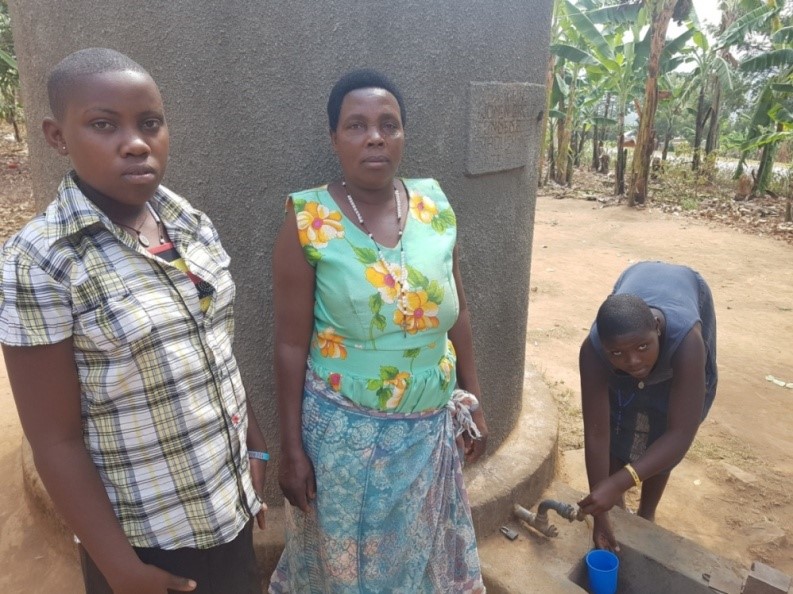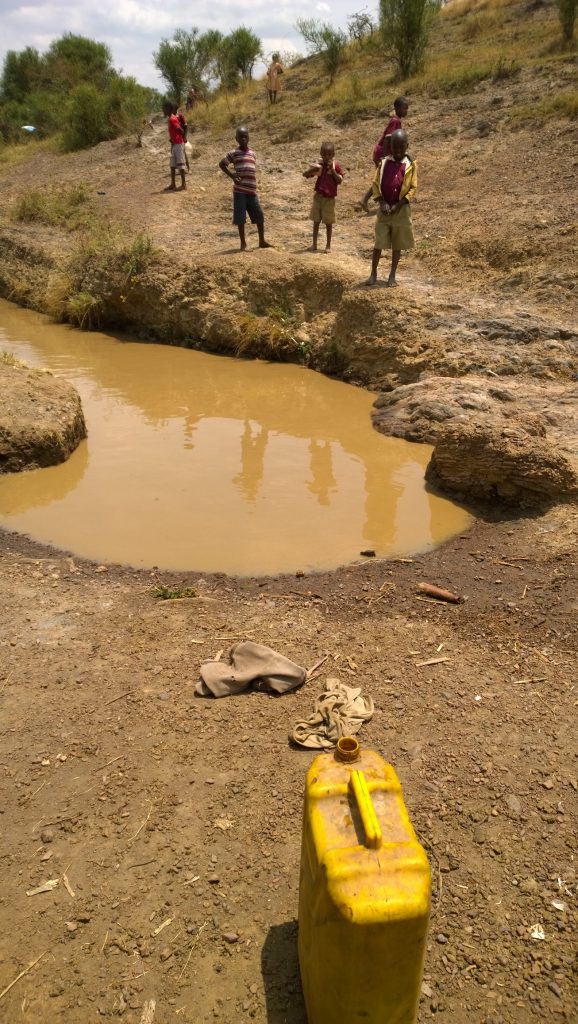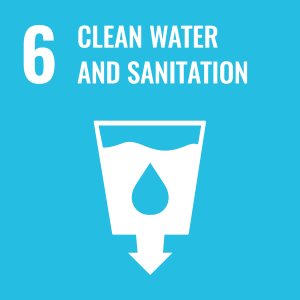A young Ugandan girl says thank you for the clean water that comes from her family’s new rainwater tank. With a tank, she will no longer have to make the dangerous, long walk to collect unsafe water. Every rainwater tank means one more family is healthier and the children are in school. Thanks for sharing hope! Image: CCS.
Hope Begins with Water
In May 2008, CWS began a partnership with the Centre for Community Solidarity (CCS) in southwest Uganda, ably led by Charles Rwabambari, a former agricultural advisor. CCS works with caregivers of families affected by HIV and AIDS. Grandparents, relatives and others who lived in the region took in children who had lost their parents because of the ravages of the disease. CCS set up local associations of caregivers with a plan to build household rainwater tanks
By the end of 2023, CCS and the community have successfully built 1,250 rainwater tanks, for both families and a few schools. The Isingiro District Council contributed a further 70 rainwater tanks. Mbabazi’s family received their tank in the last round of this phase.
Without that tank, Mbabazi says she might not have been able to sit her exams at all.
“We vehemently thank you for this wonderful water tank gift,” says Mbabazi, standing by her mother.
At the end of last year, Mbabazi topped her class in the Primary school leaving exams for year seven students and won a scholarship to secondary school. Without the water tank, she would have remained trapped in a tunnel of poverty and despair. After losing her father to AIDS, Mbabazi spent most of her time helping her mother keep the family alive. There was little time for school.
One of the most time-consuming of her daily chores was to collect the water her family needed for the day. After the rains it was easy but as weeks went by and there was no water left in the nearby streams and pools, she had to go further. In the driest weeks she would trudge down to the Kagera River, almost five kilometres away, and then carry back the jerry can, filled with water. Missing school was the hardest part for her.
Last year Mbabazi was very happy to find out that CCS would build a tank at their home. Her mother had carefully saved half the building costs.
On the first day of construction, everyone was excited. People from the community prepared the foundations and the frame under the supervision of CCS staff. There was much singing over the next few days as they worked together to cover the frame with bamboo before plastering it inside and out. Everyone shared the joy when the tank filled with water.
Building a Climate Resilient Community
CCS has a Board, two staff members and a team of volunteers who support the village associations. It uses local expertise to train the men and women in tank construction and maintenance along with hygiene, sanitation, environmental protection and climate change resilience.
The associations also take on projects to improve local livelihoods. In the early stages, CCS set up a piggery project where one piglet from the first litter is passed on to another caregiver. During Covid, it set up a similar project, this time breeding rabbits so that children could look after the rabbits and contribute to their family’s livelihood.
Water in this remote region comes from underground and contains high levels of magnesium, calcium, fluoride and potassium. It is undrinkable and stains clothes and teeth. During the two rainy seasons, rock pools and streams usually fill up with water, but with hotter temperatures and shorter seasons, the water runs dry more often. If the local water points are empty, the children have to walk up to eight kilometres to the Kagera River.
Climate Crisis Intensifies Poverty
For the people of Isingiro, the climate crisis is a water crisis. When there is no water, families have to spend many hours of the day collecting dirty water for their daily needs. The daily drudgery under the hot sun carries huge risks to the children who must collect the water. Without it, they will not be able to grow the food they need to survive or the bananas which are their cash crop.
Top Student
Doreen tells her story:
“My father died and then soon after my mother followed due to the deadly HIV and AIDS pandemic. I was taken in by my old grandparents. I had to leave school and start fetching water for my elderly grandpa.
The water source was very far away and would dry up every season. Then we had to go to the Kagera River, where a crocodile killed one of our friends. It was a long walk to the water point through thickets and stony hills. On the way, I sometimes meet dangerous people.
My grandpa joined the local group for caregivers of children affected by HIV and AIDS and the rainwater savings scheme. We were lucky. CCS constructed a rainwater tank at our home. Since then, my life has changed.”
“I went back to school. I completed my senior sixth year and miraculously scored 24 points, qualifying for a government university scholarship,” she told CCS.
Now her grandmother has water for irrigation and the family can produce more food for themselves and to sell. She is grateful for the generous support of New Zealanders.
United Nations’ Sustainable Development Goal 6 : Ensure safe water and clean sanitation for all.
Last year the Centre for Community Solidarity started the third phase of the programme in 16 more villages. CCS wants to build 286 new rainwater tanks benefitting 1,183 more children in the next four years. The tanks are in high demand.
Mbabazi and Doreen are smart young women who want others to have the same opportunities they had.
Around 26% of the world’s people do not have safe water. Your donation to our Water Appeal will be a gift of life.
Please make your gift to the Water Appeal so HIV-affected families can have clean, safe water and children can go to school.
Read as a PDF.
Thanks to CCS and Rob Wayne for the photos and stories.
Share Hope. Give Safe, Clean Water
Right now, the global climate is warming. The race is on to help people adapt to the changing conditions. A donation to the Water Appeal will support our partners working to give people the water they need to live.
With:
- $60 could improve irrigation for small-scale farmers.
- $100 could provide a safe and more reliable water supply for a family.
- $316 will pay for half the building materials and construction costs for an HIV and AIDS-affected family in Uganda.






